Action for Primates
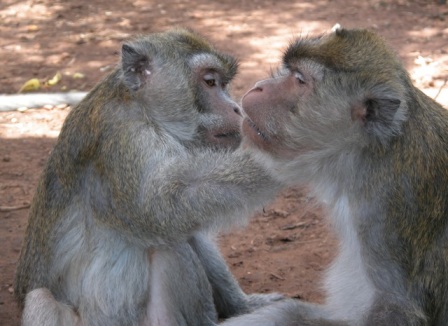
|
Action for Primates |

|
|
The following are take action items we have posted in 2025. See elsewhere for take action alerts from other years. In addition to the Take Action entries below, you can click here for petitions you can sign and share to help non-human primates around the world.
Index of action alerts; select date & title to access:
8 December 2025: Baboon foetuses and juveniles killed to study Western style diet in USA
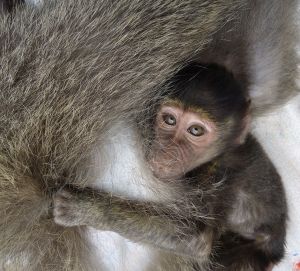
In this disturbing research, female olive baboons were forced to consume a Western-style diet and their foetuses and infants were killed as surrogates for humans (Gershner et al 2025). The experiment was done at the University of Oklahoma Health Sciences Center, was approved by their animal use committee and was funded privately and by the US taxpayer through grant of over half a million US dollars (1R01DK133207-01A1) from National Institutes of Health.
Twenty-one adult female olive baboons were given either a standard baboon chow
(control diet) or one that had high-saturated fat and high-sugar diet, so-called Western style diet (some of the baboons had previously undergone caesarean section, having their unborn babies removed from them and killed for a similar study). After three months, the females were bred to males who had previously been fed either the control diet or the Western style diet. Throughout the study, various blood and other parameters were determined after subjecting the baboons to ketamine.
Near the end of gestation, some of the baboons were subjected to caesarean section, during which their foetuses were removed and killed outright to obtain tissue. There was no mention of concern for these mothers who had their unborn babies taken from them. The remaining baboons were allowed to give birth to their babies and to nurse them until they were weaned. After weaning, the juvenile baboons were allowed to live for 2.5–3 years of age. At that point, they were killed (euphemistically referred to as euthanized
by the researchers), and tissues collected. As the researchers put it, a total of 11 fetuses (male: 7, female: 4) and 9 juveniles (male: 2, female: 7) were harvested.
[emphasis added]
What was learned? Certainly nothing that could not be derived from humane studies of humans, who could provide informed consent, something not afforded the baboons. This incredibly inhumane and immoral experiment, which resulted in substantial suffering for the baboons, including invasive surgery and death of foetuses and juveniles, demonstrates once again the lack of humanity in the treatment of female non-human primates and their infants, as well as the lack of commitment to stop using non-human primates. The baboons in this experiment were treated as simple, disposable tools by the researchers. Because this research is ongoing, countless other non-human primates will be imprisoned and will lose their lives for what can only be considered frivolous reasons and clearly contrary to the Replacement criterion for the 3Rs.
What you can do to help:
Cited information:
Information on NIH grant support (funding) is taken verbatim from relevant publications. If you have difficulty with any links provided, you can do your own search through the NIH RePORTER site: https://reporter.nih.gov/, by copying and pasting the grant number into the Search field on the form.
Be aware that some grants include funds for more than experiments on non-human primates.
28 October 2025: Rhesus macaques forced to consume cocaine in publicly funded research in USA
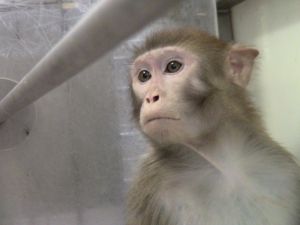
Rhesus macaques (and rats) were used to see if cocaine use could be modified by a test drug (Marsh et al 2025). The work was approved and done at the McLean Hospital in Boston, Massachusetts, which is part of Harvard Medical School. It was funded by the US taxpayer through National Institutes of Health grants R01DA055825, T32DA007027 and N01DA-24-8946 (not reported by NIH), totalling many millions of US dollars.
Eight adult rhesus macaques were subjected to surgery to implant catheters into a blood vessel. A tube attached to the catheter was 'tunnelled' underneath the skin until it reached a point between the shoulder blades. An incision was made through the skin and the tube brought out and connected to two others through which a control substance (salt solution) or cocaine could be given. The macaques were coerced into giving themselves cocaine through the use of food rewards. Each was housed alone in a stainless steel, barren cage with no meaningful enrichment. The infliction of such social and environmental deprivation on these highly sociable and intelligent macaques—in addition to their cruel use in cocaine research—is especially heartless. A panel on the front of each cage had buttons to press as part of the experiment, to deliver cocaine. A drug, xanomeline, was used to see if it modified cocaine 'use'. Testing sessions were every day, lasting up to two hours each time. During part of the testing procedure, the macaques were restrained in so-called primate chairs for the entire session.
There was no mention of the fate of the macaques nor on what the cocaine did to them emotionally, psychologically or physically, including the effects of suddenly ending its availability to the macaques. Cocaine withdrawal symptoms in humans include strong cravings, feelings of depression, restlessness and anxiety. If the macaques experienced similar effects, while imprisoned inside a small, barren cage, this would have been deeply distressing for them. These individuals were clearly considered as 'tools' to be used to get information on the effects of the test drug, effects which may or may not have any relevance to humans who use cocaine.
What was 'learned'? Under the completely artificial conditions of the experiment, the data showed that xanomeline may cause rhesus macaques to decrease choosing cocaine. None of this, however, has any relevance to humans suffering from the disease of addiction. The data to help humans are already available and more can be derived from humane and human-relevant investigations using humans with substance abuse issues, whether cocaine or other drugs. Other researchers have been critical of the use of non-human primates to 'model' the human with substance abuse disorders, pointing out what Action for Primates has been saying for years: addiction in humans is a complex disorder which encompasses psychological, social and emotional variables that are impossible to model in animals
(Magliaro & Ahluwalia 2022). It is morally wrong—and ineffectual—to keep subjecting non-human primates to a simplistic, mechanistic approach in a quest to help people. Why are non-human primates being forced to consume cocaine in such cruel and crude experiments for a disorder that is unique to humans?! The macaques in this study had to endure the stress of captivity, virtual social isolation, survival surgery, severe restraint and forced consumption of cocaine, for what can only be considered frivolous reasons and clearly contrary to the Replacement criterion for the 3Rs.
What you can do to help:
Cited information:
...the impact of social, psychological and economic factors that determine the onset and persistence of addiction (and recovery from it) in humans. Indeed, the predictive validity of animal models of addiction is poor, with few effective treatments deriving from animal studies. ...the principal argument against animal experiments in the field of substances of abuse is that addiction in humans is a complex disorder which encompasses psychological, social and emotional variables that are impossible to model in animals.
|
Primate chairs:
So-called 'primate chairs', such as those manufactured by Crist Instrument Co, are restraint devices which secure the individual in an unnatural sitting position (https://escholarship.org/uc/item/60w5n71t). Further restraint is often used through a neck plate which goes around the neck to prevent side-to-side or front to back movements of the head. The head may be severely restrained through the use of a post surgically implanted into the skull and held by part of the chair. Depending on the procedures being done, the arms and legs may be secured further by taping them to the chair supports. |
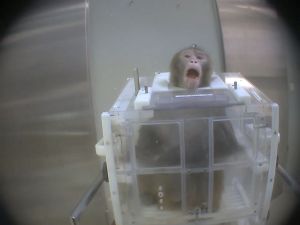
|
Information on NIH grant support (funding) is taken verbatim from relevant publications. If you have difficulty with any links provided, you can do your own search through the NIH RePORTER site: https://reporter.nih.gov/, by copying and pasting the grant number into the Search field on the form.
Be aware that some grants include funds for more than experiments on non-human primates.
17 September 2025: Monkeys from Mauritius imported by California testing laboratory
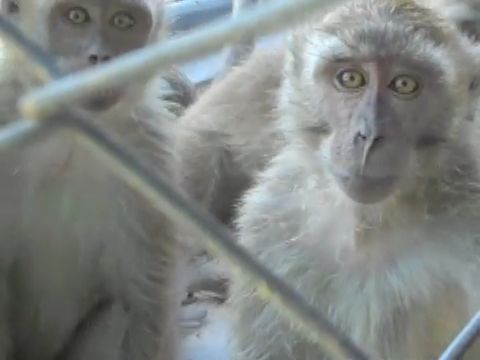
Action for Primates has received an alert that on 16th September 2025, around 500 long-tailed macaques were exported from Mauritius by Les Campeches LTEE, a primate farm located in Riviere Noire. They were transported by air from Mauritius to Paris-Charles de Gaulle Airport in France, from where SmartLynx Malta then transported them to the USA—scheduled to arrive at Chicago O'Hare International Airport in the early hours of 17th September. We estimate that the monkeys were subjected to a gruelling ordeal of almost 40 hours from leaving Mauritius, involving multiple flights and stops.
The importer—Valley Biosystems in Sacramento, California—is a contract testing company. On 15th May 2025, this facility received an official warning notice by the United States Department of Agriculture for an alleged violation of federal laws relating to the construction and maintenance of housing used for non-human primates. The official warning notice was issued after the deaths of two monkeys who became entangled and injured in their enclosures.
Latest export data show that during the first six months of 2025, 5,707 long-tailed macaques were exported from Mauritius to the USA, France, Spain and Great Britain, with 1,459 individuals exported in just one month—June.
Action for Primates has recently raised concerns after uncovering information that points to a failure by Mauritius to comply with its obligations under the Convention on International Trade in Endangered Species of Wild Fauna and Flora (CITES) in issuing permits for the export of long-tailed macaques—a CITES Appendix II listed species—and their export from Mauritius during which they are subjected to unacceptable and inhumane conditions during lengthy air transportation, involving multiple international flights and layovers. For further information: https://tinyurl.com/2w2jahar and https://tracyk.substack.com/p/probe-points-to-rule-breach-in-mauritius.
This is an unconscionable and inhumane trade, involving much suffering and distress to sentient, intelligent and social animals. Please be a voice for these monkeys:
2 September 2025: Maternal maltreatment of baby rhesus macaques encouraged in study at Emory National Primate Research Center, USA
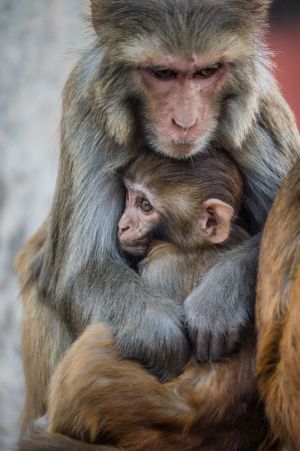
It is well-known that human children who are mistreated by their mothers are emotionally and physically compromised. The situation is a tragedy. Researchers at the Emory National Primate Research Center (ENPRC) in Georgia, USA, however, appear to believe that infliction of similar inhumanity upon rhesus macaques is acceptable. In a recently published experiment, part of a long-term series of studies, they allowed mother macaques who were known to regularly mistreat their infants, to breed and produce offspring in order to study the biochemistry of mistreated individuals (McCormack et al 2025). This work is being funded by the American tax payer through grants from the National Institutes of Health (NIH): DA038588, DA052909, MH015775 (not reported by NIH), MH078105, MH086203, P51OD011132 and S10OD010757–01. These grants have involved well over 110,000,000 US dollars, much of it being used to support the imprisonment of hundreds of monkeys at the ENPRC. The grants also support projects that involve forcing monkeys to use cocaine.
In the study we report here, infant rhesus macaques were used to determine the effects of maternal care on their hormonal development. They were born to mothers who had demonstrated competent maternal care
or those who had a history of regularly mistreating their infants. The infants were taken away from their biological mothers and raised either by "control" mothers (those who never mistreated their infants) or by mothers who mistreated their infants. Blood was taken at intervals to see the effects on biochemical and hormonal parameters. Differences between female and male macaques were also noted.
The researchers found that infant maltreatment caused abnormalities in the brain and adrenal gland function, with females being particularly vulnerable. This information, however, is irrelevant to the human situation not only because of species differences, but also because the macaques were not 'normal' given that they were in captivity, especially when confined in cages. Furthermore, researchers pointed out the various studies on humans which demonstrated the essence of what was being studied in the macaques. It is our firm belief that nothing was gained from the macaques that would in any way be beneficial in advancing how society resolves the issue of human mother maltreatment of their children.
Maltreatment of infant non-human primates by their mothers appears to be the result of keeping these individuals in captivity. It is not something that would be sustainable in a natural free-living setting and is, like stereotypical behaviours commonly seen in laboratory-housed individuals, an anomaly. It is also known to be cross-generational in captive macaques. These researchers are encouraging continuation of such maltreatment by allowing affected mothers and their offspring to breed in their facility. The propagation of such an inhumane situation is morally unconscionable and shows a profound lack of concern for the welfare and well-being of these individuals. This is, however, nothing new. Numerous forms of cruel and inhumane experiments are done regularly at the Emory National Primate Research Center, including forcing macaques to consume alcohol and cocaine; subjecting macaques to highly invasive brain surgery and death; and more.
The NIH has recently stated that they are going to shift the emphasis of their research programmes to those based on non-animal alternatives (NIH 2025-04-29; Bhattacharya 2025-08-15). Although this is welcomed by us, it is almost certain that they will still be funding extremely inhumane, wasteful and human-irrelevant research involving non-human primates because of the continued and misguided belief that these individuals are acceptable—morally and scientifically—to use as 'models' for humans. We must continue to apply pressure on the NIH to completely do away with non-human primate research. Using humans in ethical, human-relevant research, using the fundamental moral principle of informed consent—something not allowed with non-human primates—is the only morally and scientifically correct way forward to advance human health and welfare. The macaques in the studies at ENPRC had to—and will continue to endure for the foreseeable future—the stress of captivity and purposeful exposure to maltreatment for what can only be considered frivolous reasons and clearly contrary to the Replacement criterion for the 3Rs.
What you can do to help:
Cited information:
NIH is establishing the Office of Research Innovation, Validation, and Application under the Division of Program Coordination, Planning, and Strategic Initiatives, to develop, validate, and scale the use of human-biology-based new approach methodologies (NAMs) to complement animal models and enhance investigations. This office will coordinate with NIH institutes, centers, and offices to explore and prioritize ways to reduce our reliance on animal testing to advance technologies that improve translation to humans. Accordingly, all new funding opportunities that include support for animal models will also incorporate language on the consideration of NAMs. The office will serve as a hub for interagency collaboration and expand funding opportunities and infrastructure for non-animal approaches.
While traditional animal models continue to be vital to advancing scientific knowledge, using new and emerging technologies can offer unique strengths that, when utilized correctly or in combination, can expand the toolbox for researchers to answer previously difficult or unanswerable biomedical research questions.
[NIH Director Dr. Jay Bhattacharya]: This human-based approach will accelerate innovation, improve healthcare outcomes, and deliver life-changing treatments.
Information on NIH grant support (funding) is taken verbatim from relevant publications. If you have difficulty with any links provided, you can do your own search through the NIH RePORTER site: https://reporter.nih.gov/, by copying and pasting the grant number into the Search field on the form.
Be aware that some grants include funds for more than experiments on non-human primates.
18 August 2025: Rhesus macaques used as human surrogates in dietary reproductive research in USA
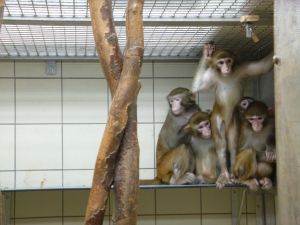
Adult female rhesus macaques were subjected to Western-style diets and testosterone hormonal treatment in order to see the effects on their ovaries in research done at the Oregon National Primate Research Center in the US (Parker et al 2025), with affiliation by the University of Pittsburgh. The work was paid for by the US tax payer through grants from the National Institutes of Health: P50 HD071836 and P51 OD011092, comprising many tens of millions of US dollars. It was approved by the Center's animal use committee.
The macaques were five–six years old. Five were considered to be 'controls' and were given a standard chow diet. Eight were given a high-fat diet (so-called Western-style) and were injected with testosterone-cholesterol implants. Male hormone concentrations in these eight individuals became similar to those for women with hyperandrogenaemia (increased male hormones) and polycystic ovary syndrome (another hormonal disorder). The five 'control' individuals only received the cholesterol implant. No information was provided on how the macaques were housed.
At the end of the study (12 months into the dietary regimen), the macaques' ovaries were removed to evaluate them microscopically. There was no mention how this was done nor the ultimate fate of the macaques. We strongly suspect that all the macaques were killed, given that removal of their ovaries would render them no longer useful for breeding or most other research.
The researchers found that a Western-style diet combined with an increase in male hormone caused reproductive abnormalities. Such information cannot be uncritically applied to humans, but could be determined through clinical research on human patients—humanely, reliably and with informed consent—something not allowed with the macaques.
The public are repeatedly told that non-human primates are used in research only when absolutely necessary and only when there are no other alternatives available. This inhumane experiment, which almost certainly resulted in death for the monkeys, demonstrates the meaningless nature of such assurances and a lack of commitment to stop using non-human primates. The macaques in this experiment had to endure the stress of captivity and likely death for what can only be considered frivolous reasons and clearly contrary to the Replacement criterion for the 3Rs.
What you can do to help:
Cited information:
This so-called Western-style diet is designed to mimic the typical American diet containing protein and fat mainly from animal sources and high in salt and saturated fats. In this research, the diet comprised 36% calories from fat, 45% from carbohydrates and 18% from protein. A standard monkey chow diet comprises of 15% calories from fat, 59% from carbohydrates and 27% from protein.
Information on NIH grant support (funding) is taken verbatim from relevant publications. If you have difficulty with any links provided, you can do your own search through the NIH RePORTER site: https://reporter.nih.gov/, by copying and pasting the grant number into the Search field on the form.
Be aware that some grants include funds for more than experiments on non-human primates.
21 July 2025: Electric currents and poison used to destroy monkeys' brains at Vanderbilt University in US
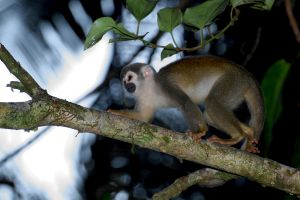
Three adult male Guianan squirrel monkeys (over three years old) were subjected to brutal brain damage—and then killed—to see the effects on the part of the brain controlling their hands (Sengupta et al 2025). The experiment was done at Vanderbilt University in the state of Tennessee in the USA, and approved by their animal use committee. It was supported by the US tax payer through grant NS078680, comprising many millions of US dollars, from the National Institute of Neurological Disorders and Stroke, a branch of the National Institutes of Health.
Before being subjected to brain surgery, the researchers determined which was the preferred hand in each monkey. With this information, they anaesthetised the monkeys and performed craniotomies in order to access the portion of the brain controlling hand movements. After cutting open the skull and determining the relevant brain region, they used a combination of electric currents and a poison to destroy that part of the brain. One of the monkeys had to have two such surgeries because the first one did not produce the desired loss of hand function. Another monkey had to have a second destruction surgery for reasons not stated. The monkeys were kept alive for as many as 46 weeks.
After these surgeries, the monkeys were unable to use their preferred hand normally. They were reluctant to use the hand for climbing and were unable to handle food normally. Whether there were other negative welfare consequences was not mentioned by the researchers. The monkeys were tested to see how impaired their hand use was and then subjected to additional anaesthesia and craniotomies to compare responses to stimuli with those that had been recorded before the brains were damaged. After this, they individuals were killed (euphemistically referred to as euthanized
by the researchers).
Nothing of value for advancing the quality of human health was derived from this exceptionally cruel and brutal experiment. The public are repeatedly told that non-human primates are used in research only when absolutely necessary and only when there are no other alternatives available. This shameful experiment, which resulted in substantial suffering for the monkeys, followed by death, demonstrates the meaningless nature of such assurances and a lack of commitment to stop using non-human primates. Not only is the information in monkeys irrelevant to people given the fundamental differences between the two species, humane and ethical clinical studies have been and can continue to be done on human patients and volunteers in order to get data that are directly applicable to people. The monkeys in this experiment had to endure the stress of captivity, major survival surgery—twice— and death, clearly contrary to the Replacement criterion for the 3Rs.
What you can do to help:
Cited information:
Information on NIH grant support (funding) is taken verbatim from relevant publications. If you have difficulty with any links provided, you can do your own search through the NIH RePORTER site: https://reporter.nih.gov/, by copying and pasting the grant number into the Search field on the form.
Be aware that some grants include funds for more than experiments on non-human primates.
13 June 2025: Squirrel monkeys injected with cannabis used as surrogates for human adolescents in Harvard University research
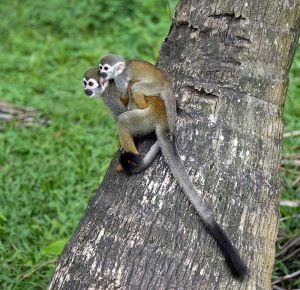
The US taxpayer has once again paid for studying the effects of cannabis (specifically tetrahydrocannabinol or THC) on more monkeys (Kangas et al 2025). This research was done at the McLean Hospital, a branch of Harvard University, and approved by its animal use committee. The National Institute on Drug Abuse (NIDA), a branch of the National Institutes of Health, provided the funds through a grant, "R01-DA047575", involving several millions of US dollars. The monkeys were used as surrogates for human adolescents in an attempt to study the long-term effects of chronic THC exposure.
To determine how chronic exposure to THC affected reward-based behaviour, twenty-three adolescent Guianan squirrel monkeys were used. The 11 female and 12 male monkeys ranged in age between 2–2.5 years. They were injected intramuscularly every day for six months with THC, some at 0.32 mg/kg and others at a substantially greater 3.2 mg/kg of body weight. Their brains were scanned before, during and after this treatment. During the testing of the effects of THC, they were placed in a touch-sensitive experimental
chamber and presented with stimuli on the screen which they had to touch. Sweetened condensed milk solution was offered as a reward. The 'harder' the monkeys worked, the more 'rewards' they received.
The researchers found that the monkeys exhibited "abnormalities in motivation and reward processing" as a result of chronic exposure to THC. This is hardly surprising in that such alterations by THC or other drugs in humans have already been demonstrated, as acknowledged by the researchers. The researchers concluded, to paraphrase them, that chronic cannabis use during adolescence may have health consequences later.
The ultimate fate of the squirrel monkeys was not stated. Nor was there any consideration of what internal (emotional, psychological) effects THC had on the monkeys and what effects there might have been on discontinuing the drug.
Tetrahydrocannabinol is the main psychoactive ingredient in cannabis. It acts as a mild sedative at low doses and a hallucinogen at high doses. Psychoactive drugs alter brain function and can cause changes in mood and awareness. All this has been already determined in humans and is well known. Not only is the information derived from these squirrel monkeys irrelevant to people given the fundamental differences between the two species, humane and ethical clinical studies have been and can continue to be done on human patients and volunteers in order to get data that are directly applicable to people. There is no shortage of cannabis users worldwide, involving people of most ages. The enormous funds being expended to make monkeys 'addicts' could be used to learn more about the human condition, helping them at the same time. It is clear to us that the researchers in this case, and the animal use committee whose federal mandate is to ensure that non-human primate use is absolutely essential, demonstrated flagrant disregard for the Replacement criterion for the 3Rs.
What you can do to help:
Cited information:
Information on NIH grant support (funding) is taken verbatim from relevant publications. If you have difficulty with any links provided, you can do your own search through the NIH RePORTER site: https://reporter.nih.gov/, by copying and pasting the grant number into the Search field on the form.
Be aware that some grants include funds for more than experiments on non-human primates.
23 May 2025: Take action against online animal cruelty during Report It! Week
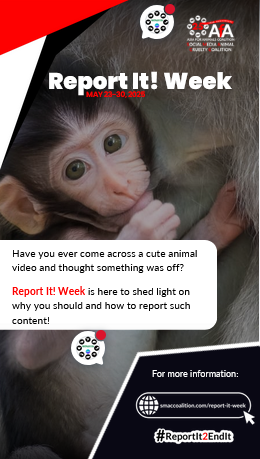
Report It! Week (23-30 May) is an event organised by the Social Media Animal Cruelty Coalition (SMACC), a collective of 34 animal protection organisations, including Action for Primates. It is a time dedicated to raising global awareness about online animal cruelty and reinforcing a powerful message on the importance of reporting this type of content to social media platforms.
During Report It! Week, SMACC is urging social media companies to take meaningful action against animal cruelty content shared on their platforms. SMACC calls upon these companies to respond to reports from the public and animal protection experts by promptly removing abusive content. The coalition also invites platforms to collaborate with its experts to strengthen animal welfare policies and improve content moderation systems—ensuring that cruelty to animals has no place online.
Report It! Week will drive home the message that reporting matters. By raising awareness, we aim to influence social media users and companies to stop overlooking this cruelty.
New data released by SMACC, reveal that shocking and harmful animal cruelty content continues to be rife on social media platforms. During 2024, 80,972 cruelty related links were identified by the public and assessed by the coalition. Facebook accounted for 87.5% of those links reported. Non-human primates (especially macaques), dogs and cats featured heavily in this cruel content.
Disturbing content of deliberate and gratuitous abuse involving animals, including baby monkeys, is posted on channels and by online groups, with some channels monetised. Particularly horrifying has been the disturbing escalation in the violence, torture and death inflicted upon baby monkeys. Other harmful content, however, may not always be easy to spot. Animal cruelty does not just comprise physical harm—it includes keeping wild animals as 'pets'; dangerous staged 'rescues' where an animal is deliberately placed in potentially harmful situations with the film maker then playing the role of 'rescuer'; and forcing animals to do unnatural tricks for 'entertainment'.
SMACC researchers also collected a separate set of data:
Despite social media platforms implementing policies against such content, the data demonstrate gaps in identifying and removing the flagged content.
Online animal cruelty is increasingly being recognised within global legal frameworks. The legislative landscape around digital safety is rapidly evolving, with governments placing more defined responsibilities on platforms to mitigate online harms, including animal cruelty. Under the UK's Online Safety Act 2023, animal cruelty is classified as priority illegal content. Platforms are required to proactively detect and swiftly remove such material, with non-compliance resulting in fines of up to £18 million or 10% of global annual revenue, enforced by Ofcom.
17 May 2025: Bill to ban non-human primates as 'pets' reintroduced in US Congress
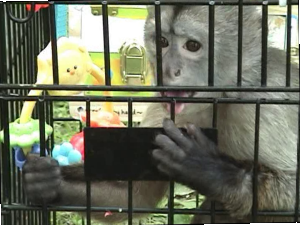
Action for Primates has welcomed the reintroduction in Congress of the Captive Primate Safety Act (CPSA). This bipartisan legislation, sponsored by Representatives Mike Quigley (D-IL), Brian Fitzpatrick (R-PA), Julia Brownley (D-CA) and Nancy Mace (R-SC), and Senator Richard Blumenthal (D-CT), would ban the private 'ownership' of all non-human primates as 'pets', thereby providing better animal welfare protection, as well as strengthening public safety.
In the US, the private 'ownership' of non-human primates is still legal in many states. These animals are bred commercially to be sold as 'pets'; infants are removed from their mothers and advertised for sale dressed in human children's clothes. Non-human primates are wild animals and do not belong in captivity in homes and backyards. They should be living freely with their family and social groups in their native habitat. Depriving them of their freedom, the companionship of others of their kind and keeping them under totally unnatural conditions, is cruel and immoral.
When kept in captivity as 'pets', non-human primates can become a danger to people. As they mature and become physically stronger, they become unpredictable and aggressive towards humans and can cause serious injuries. To deal with this aggression, people will often add to the inhumanity of the situation by removing teeth and nails in the erroneous belief that this will prevent injuries.
Monkeys and apes belong in the wild—not in living rooms. This bill will ban private possession of these animals, ensuring that we are safe and primates are able to live freely,
said Congressperson Mike Quigley (IL-05), co-chair of the Congressional Animal Protection Caucus. Quigley recently visited the Born Free Primate Sanctuary in Texas, to learn more about the plight of primates kept as 'pets' and the important work carried out there to rescue and rehabilitate these often damaged individuals: https://quigley.house.gov/media-center/press-releases/quigley-concludes-trip-texas-primate-facilities-introduces-bipartisan.
Private ownership of primates is a dangerous and outdated practice that puts both animals and communities at risk,
said Congressperson Fitzpatrick (PA-01).
Primates are intelligent and social creatures. But when primates are kept as pets—in captivity and restrained—they can become highly unpredictable and dangerous,
Senator Blumenthal (CT). Wild animals belong in the wild, and this legislation ends the inhumane exploitation of these animals as pets—protecting both people and primates.
The Bill can be found here: https://www.congress.gov/bill/119th-congress/house-bill/3199
You can find more information on the issue of non-human primates in private homes on our non-human primates in Private homes ('pets') page.
This is an important piece of legislation and the fact that it has bipartisan support is crucial. If you are a US citizen, please contact your legislators and politely urge them to support this bill.
6 May 2025: Rhesus macaques in USA had brains mutilated to damage use of their hands

Rather than apply their technique for improving hand function on human patients with stroke, these researchers brutally destroyed parts of the brains of rhesus macaques to use as a "monkey model" at the University of South Dakota (Darling et al 2024). Incredibly, this work was paid for using public funds from the National Institute of Neurological Disorders and Stroke, a branch of the National Institutes of Health. The grants—NS046367 and NS097450—comprise several million dollars US to date.
Four rhesus macaques were used, two females, two males, ranging in age from five to six years. They were housed individually in steel cages, deprived of any meaningful social enrichment. Their 'handedness' was determined using small food items. Before testing sessions, the monkeys were deprived of food ("food restricted") for 18–24 hours.
Once each monkey's preferred hand was determined, they were anaesthetised and subjected to craniotomy). During this highly invasive surgery, the parts of the brain essential for preferred hand motor control were removed by "aspiration" (sucked out).
After recovering from this brutal surgery, the monkeys were unable to use their preferred hand. The researchers stated that the use of this hand was clearly impaired in the days following the lesion as the monkeys did not use the hand for postural support or other motor tasks and dragged the hand on the cage floor, as if unaware of the tactile [touch] inputs
. From two weeks after the brain had been damaged, forced use therapy involving the hand impaired due to brain damage was done three times a week for 24 weeks, with at least 300 reaches for food per session. Although not explicitly stated, it is likely that substantial food restriction was also used in order to 'motivate' the macaques, similar to when 'handedness' was determined. Further, to prevent the non-injured hand from being used, food was in a container which the macaque could only access using the impaired hand.
It was found that the monkeys recovered considerable use of the impaired hand, something already shown in human patients with similar, but naturally occurring, brain lesions. Although not explicitly stated in the article, it seems clear that the four rhesus macaques were killed after testing in order to get their brains for microscopic study.
This shameful experiment, which resulted in substantial suffering for the monkeys, demonstrates the meaningless nature of assurances that non-human primates are only used where absolutely necessary. The treatment method used in the macaques is already being used in human stroke patients. Sophisticated neurophysiological testing can be (has been) done on these patients. This can be augmented with careful post-mortem studies, when the time comes, in order to derive information directly relevant to understanding and helping other patients, rather than concocting inhumane experiments in monkeys. Post-mortem examination of human patients (autopsy) furnishes scientific data for medical research that can never be matched by the most imaginative of investigative protocols for animal models of human disease
(Zimmerman 1984).
What you can do to help:
Cited information:
Craniotomy:
This is a surgical procedure to access the brain. Typically, an area on the head is shaved. An incision is made through the skin and tissues underlying it, down to the surface of the skull, in such a way as to create a flap that can be pulled away to expose the skull. Depending on what type of access to the brain is required, holes may be drilled through the skull into the brain cavity, for example for injections, or a portion of the bone may be cut out in order to implant a bank of electrodes. When done, bone cement may be used to fill in the hole in the skull and the overlying tissues sutured.
Information on NIH grant support (funding) is taken verbatim from relevant publications. If you have difficulty with any links provided, you can do your own search through the NIH RePORTER site: https://reporter.nih.gov/, by copying and pasting the grant number into the Search field on the form.
Be aware that some grants include funds for more than experiments on non-human primates.
17 April 2025: Marmosets forced to drink alcohol in US research to become 'new' surrogate for human alcoholics
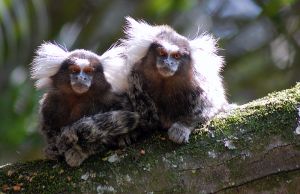
It is not enough that baboons, macaques and rodents are being used routinely as surrogates for human alcoholics. A researcher at the University of Pittsburgh is now trying to create a marmoset research model to help bridge the rodent to human translational gap in the alcohol field
and because the marmoset is cheaper and easier to use than other non-human primates (Homanics 2024). The work is taking place at the University of Pittsburgh School of Medicine in the USA and is sponsored by the Systems Neuroscience Center at the University of Pittsburgh which is supported by US taxpayers through funding from the National Institutes of Health. This further assault on non-human primates was approved by the animal use committee at the University of Pittsburgh.
Marmosets are not willing subjects and are even more difficult to coerce into drinking alcohol-laced water than other species. The researcher had to try different sweeteners before finding that pulverised marshmallows in the solution made it palatable enough for some individuals to drink it. Even then, the marmosets refused to drink anything stronger than a little over a 6% solution of ethanol.
Seventeen laboratory-bred female and male marmosets were used. They ranged in age from 9–53 months of age when first started in the experiment (euphemistically referred to as enrollment
, as if the marmosets made a decision to become involved). Rather than house them socially in large groups—something critical to their welfare and well-being—they were housed two to a steel cage. Even this nominal social concession was not provided if compatibility issues precluded pairing
.
The marmosets were subjected to multiple test sessions during which they were exposed to ethanol-laced water. They would not, however, drink water that had only alcohol in it. Various sweeteners were used to try to coerce the marmosets to drink the solution. The only one that worked was pulverised marshmallows in the ethanol-laced solution (which was 4%–6.75% ethanol). In addition to being forced to drink alcohol during binge-like drinking sessions
, the marmosets were also injected with 20% ethanol solution into their peritoneal cavity (abdomen) to see how it was metabolised. Although blood was taken from leg vein to establish concentrations of ethanol numerous times after each 'drinking' session, the method was not provided.
When offered a choice, the marmosets had a strong preference for ethanol-free marshmallow juice over the one which contained ethanol. This is certainly at serious odds with the enthusiasm of the researcher that the marmoset may be a good model
for human alcoholism. The situation does not bode well for marmosets, however, in that the researcher stated that [M]ore work is needed to establish
this model
.
The public are repeatedly told that non-human primates are used in research only when absolutely necessary and only when there are no other alternatives available. This shameful experiment, which puts the lives and well-being of countless marmosets at risk, demonstrates the meaningless nature of such assurances and a lack of commitment to stop using non-human primates. Humane and ethical clinical studies have been and can continue to be done on human patients and volunteers in order to get data that are directly applicable to people. Not only is this attempt to turn marmosets into 'alcoholics' abjectly inhumane and clearly contrary to the Replacement criterion for the 3Rs, this approach to substance abuse is criticised by others in the field (Magliaro & Ahluwalia 2022).
What you can do to help:
Cited information:
...the impact of social, psychological and economic factors that determine the onset and persistence of addiction (and recovery from it) in humans. Indeed, the predictive validity of animal models of addiction is poor, with few effective treatments deriving from animal studies. ...the principal argument against animal experiments in the field of substances of abuse is that addiction in humans is a complex disorder which encompasses psychological, social and emotional variables that are impossible to model in animals.
24 March 2025: Baboons forced to consume alcohol and nicotine in publicly funded research in USA
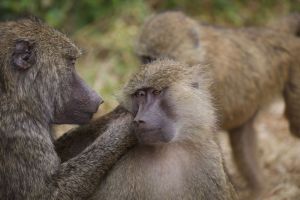
Olive baboons were used as surrogates for people in alcohol and nicotine research at the Johns Hopkins University School of Medicine in Maryland, USA (Lee et al 2024). The study was approved by the Johns Hopkins University animal use committee and was funded by the US taxpayer through National Institute on Alcohol Abuse and Alcoholism (NIAAA, part of the National Institutes of Health) grant R01AA015971 (many millions of US dollars) and other funds from the National Institutes of Health.
In an effort to determine if the hormone oxytocin had an effect on alcohol and nicotine use, five adult male olive baboons used (between 19 and 28 years of age). Although no information was provided about the source of the baboons, because the ages were estimated, we have to assume that some or all had been wild-caught. They had already been coerced into drinking alcohol (ethanol) for about one to over six years before being used in this study. Three also had previously been coerced into using nicotine. Each had been surgically implanted with a chronically (permanent) indwelling intravenous catheter. They were housed singly in steel cages, denying them the opportunity for meaningful socialisation, in sharp contrast to the freedom and social bonding enjoyed by the baboons in our photo. Not only is socialisation critical for welfare and well-being, denying it makes for bad science; data from deprived individuals are not reliable.
As part of the experiment, each baboon was anaesthetised every 2–3 weeks in order to clean their cages and examine them. It is unquestionable that placing unwilling individuals—the baboons in this case—under anaesthesia is an unpleasant experience. Recovery is also associated with considerable discomfort.
Alcohol was provided as a 4% weight/volume solution. This and nicotine were given intravenously in response to choices made by the baboons. The baboons' cages were also the site where testing was done using a response panel in each. Sessions were conducted six hours a day, seven days a week to simulate heavy alcohol drinking sessions that approximate those of humans in quantity and duration
. Oxytocin was given to see its effect on alcohol consumption. It was found that it reduced alcohol consumption to some degree. No information was provided on the impact the alcohol and nicotine had on the baboons, what happened when it was stopped, nor on their ultimate fate.
Alcohol use disorder (AUD) is a complex disease, compounded by genetics, socioeconomic issues, psychological factors and more. Imprisoning sentient non-human primates in single cages for years and forcing them to consume alcohol and nicotine is an incredibly immoral and scientifically unreliable means of trying to find a treatment for people. Not only is the information in baboons irrelevant to people given the fundamental differences between the two species, humane and ethical clinical studies have been and can continue to be done on human patients and volunteers in order to get data that are directly applicable to people. The researchers documented several human studies that provided necessary information to proceed with more human studies. We have to ask, therefore:
The baboons in this experiment had to endure the stress of captivity, virtual social isolation, survival surgery, the impact of being forced to consume alcohol and nicotine, and the suffering caused by repeated anaesthesia for what can only be considered frivolous reasons and clearly contrary to the Replacement criterion for the 3Rs.
Other researchers have been critical of the use of non-human primates to 'model' the human in substance abuse studies (Magliaro & Ahluwalia 2022).
What you can do to help:
Cited information:
...the impact of social, psychological and economic factors that determine the onset and persistence of addiction (and recovery from it) in humans. Indeed, the predictive validity of animal models of addiction is poor, with few effective treatments deriving from animal studies. ...the principal argument against animal experiments in the field of substances of abuse is that addiction in humans is a complex disorder which encompasses psychological, social and emotional variables that are impossible to model in animals.
Information on NIH grant support (funding) is taken verbatim from relevant publications. If you have difficulty with any links provided, you can do your own search through the NIH RePORTER site: https://reporter.nih.gov/, by copying and pasting the grant number into the Search field on the form.
Be aware that some grants include funds for more than experiments on non-human primates.
21 February 2025: Infant bonnet macaques just days old subjected to spinal cord mutilation in USA
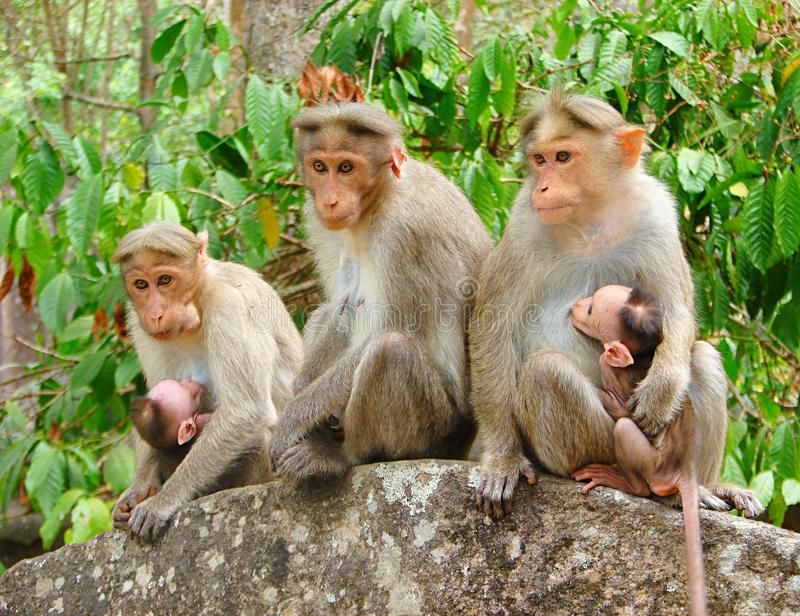
Infant bonnet macaques – some just three days old – had their spinal cords partially severed to see how the brain developed as a result of cutting certain nerves in the spinal cord. The publicly funded research was carried out at Vanderbilt University in Tennessee (Jain et al 2025). This brutal treatment of baby monkeys was approved by the university's animal use committee and was partially funded through grant NS016446 from the National Institute of Neurological Disorders and Stroke, a branch of the National Institutes of Health. The grant has been in the millions of US dollars over the past many years.
The infant macaques, who ranged in age from three days to 12 days old, were removed from their mothers. Each was subjected to highly invasive spinal cord surgery and destruction. Under anaesthesia, the skin over the spine was incised and muscles and other tissue pulled aside to expose the vertebral column (vertebrae). Part of the bone was removed from the vertebrae (partial laminectomy) to expose the spinal cord. The covering over the cord (dura) was cut into and a bundle of nerves was severed on one side. The surgical wound was sutured. After the infants recovered from this brutal surgery, they were returned to their mothers and allowed to live for three to five years after which time, they were subjected to further surgery and then killed.
The surgically mutilated macaques were anaesthetised and subjected to invasive surgery of the skull in order to implant electrodes and recordings were made. The level of anaesthesia was sufficiently low enough to allow the brain to respond to external stimuli, such as taps on a hand or touching specific digits or parts of the face. At the end of the recording session, the macaques were killed by injection of fixative into the vascular system. The brains and spinal cords were removed for further study.
The researchers thought that their findings suggested alternate nerve pathways can develop if the damage they caused was before the macaques were nine days old. Whether this has any relevance to humans is entirely speculative. Only studies in humans with spinal injuries can determine the nuances of brain development as a consequence. Further, 'mapping' of the nerve function zones would be more reliable and meaningful in humans who do not have to be subjected to invasive brain surgery in order to get results.
Please take action in memory of the six macaques whose lives were taken from them in this cruel and inhumane way:
Cited information:
Jain, Neeraj; Qi, Hui-Xin; Raman, Arun; Lyon, David and Kaas, Jon H. 2025-01-21 Cortical reorganization following dorsal spinal injuries in newborn monkeys reveals a critical period in the development of the somatosensory cortex Proceedings of the National Academy of Sciences of the United States of America 122(4):e2417417122
Information on NIH grant support (funding) is taken verbatim from relevant publications. If you have difficulty with any links provided, you can do your own search through the NIH RePORTER site: https://reporter.nih.gov/, by copying and pasting the grant number into the Search field on the form.
Be aware that some grants include funds for more than experiments on non-human primates.
6 February 2025: Urgent Call for Mauritius to Reject Monkey Testing Deal with Charles River Laboratories
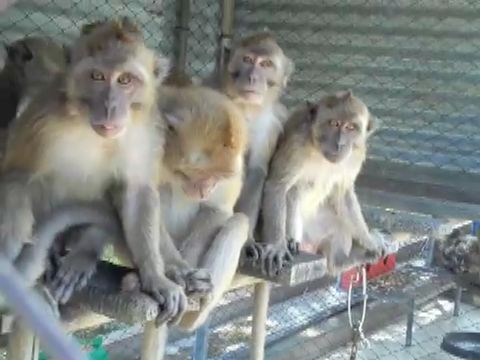
Action for Primates has joined with other animal protection groups from Mauritius, the USA and Europe – Monkey Massacre in Mauritius, PeTA, Cheshire Animal Rights Campaigns, One Voice and Abolición Vivisección – to send a letter to the Mauritian Prime Minister, appealing for the Government to abandon plans to sign a memorandum of understanding (MOU) with Charles River Laboratories. If approved, the MOU would enable the company to carry out pre-clinical testing, including toxicity (poisoning) testing, in the country using long-tailed macaques.
With the scientific community increasingly questioning the use of monkeys on ethical, moral, and scientific grounds – and groundbreaking, non-animal technologies rapidly advancing – signing an MOU would be a regressive and short-sighted move. Instead of clinging to an outdated and ineffective practice, Mauritius has the opportunity to lead in the global shift toward humane, human-relevant, and cutting-edge research methods that represent the true future of science.
The continued use of monkeys in research is not only ethically and scientifically flawed, but also poses a serious public health risk. Mauritius has already been linked to multiple shipments of tuberculosis-infected monkeys, underscoring the dangers of this trade.
Mauritius' global image as a popular holiday destination is already tarnished by its large-scale monkey export industry, with over 10,000 macaques shipped annually to testing laboratories in the USA and Europe. The establishment of a testing facility by Charles River Laboratories – one of the most controversial users of long-tailed macaques – would only deepen this stain. Not only would it further damage the country's reputation, it would also drive an increase in the capture, breeding, suffering, infectious disease transmission and deaths of these exploited animals. Instead of expanding this cruel industry, Mauritius should take a stand against it.
Please take action for the monkeys in Mauritius:
27 January 2025: Rhesus macaque babies removed from mothers and killed to study brain development in USA
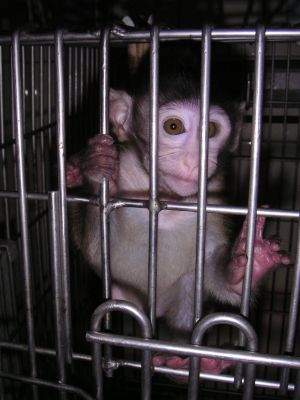
Rhesus macaque babies were removed from their mothers and killed in order to see the effects on specific cells in the brain in research done at the University of Pittsburgh in the USA (King et al 2025). This inhumane treatment of the macaques was approved by the university's animal use committee and funded, in part, by the NIH through grants HD103536, MH127486, MH41712 and NS115705, totalling several million US dollars.
The researchers dispassionately referred to their experiment as a novel maternal separation protocol, to examine the effects of early life stress
. This cruel experiment took the lives of twenty-three baby rhesus macaques. The 'test' individuals were removed from their mothers, either after a week or one month of life, in order to cause stress
to see its effects on a cell population in the brain. The macaques were allowed to live for three months or 4-5 years and then killed to get their brains, euphemistically referred to as harvested
. The researchers referred to the killing as sacrifice
. Not that this is a critical issue, but we are astounded that the manuscript reviewers and the journal editors allowed the use of such an archaic and offensive term.
The researchers acknowledged shortcomings of the work including the sheer value of the primate animals used
and that their causing of stress was not well-controlled and may have rendered the results unreliable. They also pointed out that their work in no way provided an understanding of the function of the cells studied, even if this had any applicability to incarcerated macaques, let alone humans.
This incredibly inhumane experiment resulted in substantial suffering and loss for the separated babies and for the mothers whose babies were forcefully taken from them. The information in macaques is irrelevant to people given the fundamental differences between the two species. Careful and ethical clinical and postmortem studies on humans have and will continue to provide valuable insights into how the human brain functions, not artificial and barbaric experiments on monkeys (or other non-consenting beings). Funding agencies can promote a paradigm shift in the situation by only funding studies that are not only human-relevant, but also humane.
What you can do to help:
Cited information:
Information on NIH grant support (funding) is taken verbatim from relevant publications. If you have difficulty with any links provided, you can do your own search through the NIH RePORTER site: https://reporter.nih.gov/, by copying and pasting the grant number into the Search field on the form.
Be aware that some grants include funds for more than experiments on non-human primates.
10 January 2025: Airline alert: urge SmartLynx Malta to stop January monkey transport
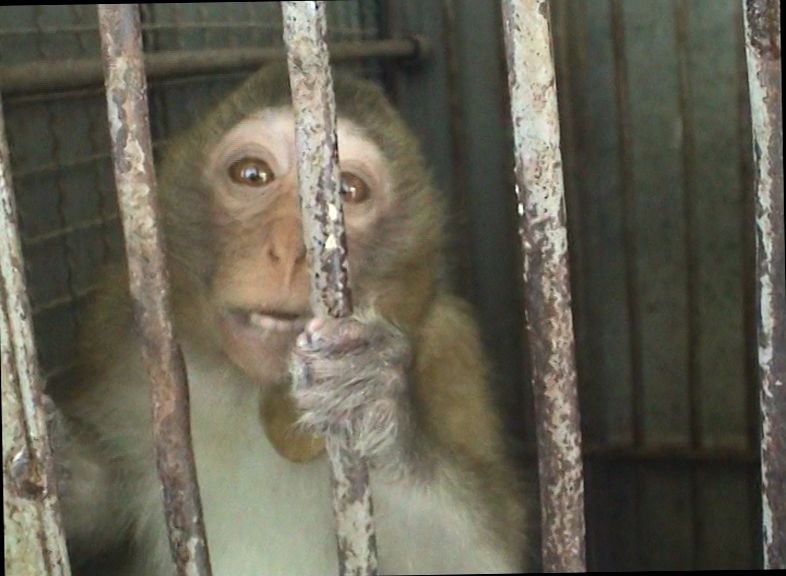
Action for Primates has been alerted that SmartLynx Malta is scheduled to transport hundreds of long-tailed macaques – in January 2025 – as cargo from Vietnam, destined for laboratories in the USA. Torn from their families and friends, these intelligent, sentient and complex beings will be forced to endure a traumatic and frightening ordeal, each confined to a small, single crate. Subjected to unimaginable stress and anxiety, they will be loaded into cargo holds to be shipped thousands of miles across the world, involving many hours and multiple stop-overs. This is an inhumane and immoral trade in monkeys' lives. In the past few months, SmartyLynx Malta has transported thousands of Endangered long-tailed macaques from Mauritius and Vietnam to non-human primate dealers and laboratories in the USA and Europe.
SmartLynx Malta is a Latvia-based charter airline, and part of SmartLynx Airlines which, in turn, is part of the Avia Solutions Group, a large aviation services provider with its headquarters in Dublin.
As a result of public concern and opposition, many airlines and cargo carriers, including American Airlines, British Airways, United Airlines, South African Airways, Delta Airlines, Eva Air, Air Canada, China Airlines and Kenya Airways, made the decision to end their involvement in the cruelty and suffering caused by the international trade in non-human primates, by refusing to transport these animals destined for the research industry. More recently, Air France stopped in 2023, after decades of transporting long-tailed macaques from Mauritius and Vietnam to the USA and Europe.
Please join our call to SmartLynx Malta and the Avia Solutions Group to stop their involvement in the brutal trade in macaques for the global research and toxicity (poisoning) testing industry.
What you can do to help:
6 January 2025: Rhesus macaques subjected to brutal brain damage and death in USA

Rhesus macaques had part of their brain removed, followed by virtual social isolation, and then death, in research done at the National Institute of Mental Health (NIMH), a branch of the National Institutes of Health in the USA (Eldridge et al 2024). This brutal treatment of these macaques was approved by the NIMH animal use committee and was stated to have followed the Guide for the Care and Use of Laboratory Animals. It was paid for by the US taxpayer through the Intramural Research Program of the NIMH.
Three adult male rhesus macaques were housed singly in metal cages. Although they might have been able to smell, hear or see each other, they were not allowed meaningful social contact, which at a minimum includes the ability to touch, groom and interact directly with others of their kind. This constitutes extreme privation, something that not only is severely detrimental to their welfare and well-being, it also has profound effects on their brains, which means potentially serious confounding of any results sought by the researchers.
Each macaque was subjected to highly invasive brain surgery. After preparing the head, the researchers made an incision through the skin and underlying tissues in order to expose the skull. Bone was sawed through and a portion removed. The thick membrane covering the brain (dura mater) was cut and pulled aside. A suction apparatus was inserted deep into the brain and an entire side of what is known as the orbitofrontal cortex (an area of the brain that controls emotion and behaviour) was aspirated
(sucked out). After this mutilation, the surgical wound was closed.
The macaques were allowed to survive for at least four weeks after surgery, at which time they were killed (euphemistically referred to as euthanized
by the researchers) in order to obtain their brains for further study. The researchers did not even bother to determine the effects such brain damage had on the macaques' short lives.
The goal of this brutal, inhumane research was to determine the distribution of a particular class of nerve fibres which might be involved in certain aspects of brain function. The researchers claimed they were trying to resolve conflicting findings in studies on other macaques. They pointed out, however, that there were data already available from studies on human beings, in particular those who had naturally occurring damage to the same area of the brain being studied in the macaques! The results in the macaque study will have no meaning for humans and are not necessarily even relevant to other macaques (Petticrew & Smith 2012).
Despite protestations to the contrary by the research industry, non-human primates continue to be used in archaic and extremely inhumane research that has no direct relevance to people. If funding agencies would only fund innovative, humane and human-relevant studies using human patients and volunteers, researchers would stop concocting these archaic experiments and concentrate on truly helping humans. We join with experts in primatology in calling for an end to these experiments (Padrell, et al 2021).
What you can do to help:
Cited information:
Here, we will review previous studies showing that primates have complex behaviour and cognition, and that they suffer long-term consequences after being used in invasive research.
Although some invasive studies have allowed answering research questions that we could not have addressed with other methods (or at least not as quickly), the use of primates in invasive research also raises ethical concerns. In this review, we will discuss (i) recent advances in the study of primates that show evidence of complex behaviour and cognition, (ii) welfare issues that might arise when using primates in invasive research, (iii) the main ethical issues that have been raised about invasive research on primates, (iv) the legal protection that primates are granted in several countries, with a special focus on the principle of the 3Rs, and (v) previous and current attempts to ban the use of primates in invasive research. Based on this analysis, we suggest that the importance of a research question cannot justify the costs of invasive research on primates, and that non-invasive methods should be considered the only possible approach in the study of primates. [emphasis added]
Primatologists themselves have warned repeatedly about over-generalising from primate data to human societies...the data may not even be generalisable between similar species of monkey, as comparative research and field studies suggest that there are striking differences in group composition, social spacing, dominance and aggression between species...The social and hierarchical behaviour of Macaca fascicularis, the species used in many of these studies, may not therefore even be representative of all of its own genus, which raises doubt about extrapolation to higher primates.
Information on NIH grant support (funding) is taken verbatim from relevant publications. If you have difficulty with any links provided, you can do your own search through the NIH RePORTER site: https://reporter.nih.gov/, by copying and pasting the grant number into the Search field on the form.
Be aware that some grants include funds for more than experiments on non-human primates.
![]()
![]()
![]()
![]()
![]()
Contact us via E-mail
Copyright © 2020-2026 Action for Primates. All rights reserved.